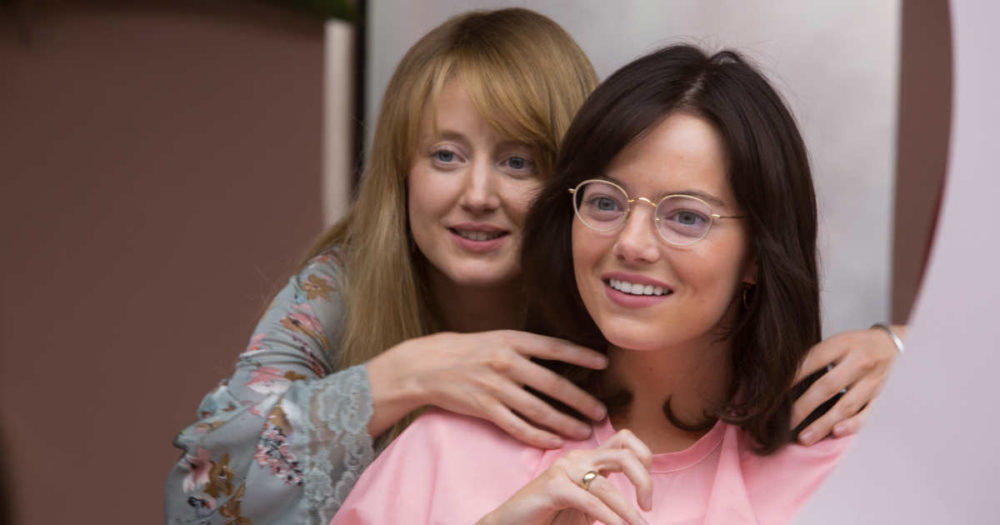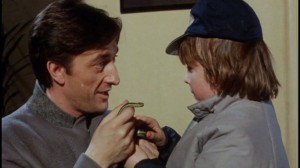
In Tom Stoppard’s play The Real Thing, Henry talks about how, in Biblical Greek, “knowing” is used for making love: “Whosit knew so-and-so. Carnal knowledge. It’s what lovers trust each other with. Knowledge of each other, not of the flesh, but through the flesh.” These different degrees of knowledge and knowing are also referenced in Battle of the Sexes, the new film about the Bobby Riggs/Billie Jean King showdown. Ted Tinling, a designer for female tennis players, says that “there’s knowing, and there’s knowing,” in reference to Billie Jean’s exploration of her identity and desire.
This self-exploration is the most compelling thing about Battle of the Sexes, a nuanced study of attraction, fluidity, and what a person wants from life; in spite of her burgeoning relationship with hairdresser Marilyn Barnett, for Billie Jean, it’s still all about tennis, even as she begins to come to terms with the things she wants, and the person that she might be.
There’s a scene early on in the film where Billie Jean and Marilyn meet for the first time. Marilyn is giving Billie Jean a haircut. It sounds simple enough, and it is. But the scene is executed in such a way that every moment, every look, is anything but simple, is loaded with possibility. Before doing anything, Marilyn says “Billie Jean, what do you want?” while running her hands through Billie Jean’s hair. There’s a silence before Billie Jean says to Marilyn “I don’t know what you mean.” The burgeoning desire that the two women feel for each other, even during their first meeting, lives in these moments: in the silences, in the miscommunications that might not be miscommunications at all. That’s where their relationship would have to live in the 1970s. Marilyn shows more confidence than Billie Jean, if not with what she wants, then at least with what she thinks, saying, “you don’t care how you look? A pretty girl like you.” This leaves Billie Jean tongue-tied. In the end, the response she settles on giving is “thank you for saying that.” And then Marilyn gives Billie Jean a haircut, one she insists will create the feeling of being “a whole new person.” The scene goes about showing that transformation, using something as everyday as a haircut. That’s where passion begins; in the everyday, in a moment that becomes loaded with intimacy because of how you feel, when hands through your hair suddenly have the power to drown out the rest of the world. And that’s exactly what happens. While Marilyn gives Billie Jean a haircut, the film deliberately fades out the sounds of everyone else in the room; it’s almost dreamlike, the way they sound so far away, hearing the sound of scissors cutting, feeling the sensation of hands moving with purpose.
Given the way that Battle of the Sexes engages with larger political issues, it’s no surprise that the romance between Billie Jean and Marilyn becomes one of the focal points of the film. But it isn’t used to make blanket statements about equality, or trying to present any kind of universal queer experience. Instead, what’s shown is an experience that’s at once both personal and political. After spending the night with Marilyn for the first time, Billie Jean is startled back into the real world by the sound of a phone ringing. She’s panicked, certain that either her husband or her parents are on the other end of the line. They know, they must, she’s sure of it. Billie Jean seems convinced that anything she knows about herself is something that everyone else knows too; maybe it comes from being on TV, being an icon, but she seems convinced that she can’t have something that’s private, that’s only hers.
In Battle of the Sexes, there’s knowing, and then, later down the line, there’s knowing. Billie Jean knows what she wants before she knows what she should call herself, before she knows what she is. In a hotel room with Marilyn, before anything happens between them, she says that she’s married. Marilyn says she “has a boyfriend. Sort of.” Identity is never presented as simple in Battle of the Sexes, neither Billie Jean or Marilyn comes away from their shared experiences knowing what they are with any kind of certainty. That’s what Battle of the Sexes captures so well about the beginnings of queer desire: uncertainty, and the constant process of questioning. Does this person feel the same things as me? What changes if I’m with the person? For Billie Jean, it becomes a matter of knowing and knowing, but never knowing with perfect certainty.
—
Directed by Jonathan Dayton and Valerie Faris; written by Simon Beaufoy; starring Emma Stone, Steve Carell, Sarah Silverman, Bill Pullman, Alan Cumming, Elisabeth Shue, Austin Stowell, and Eric Christian Olsen; 121 minutes.



 Derek
Derek
 Isabelle
Isabelle